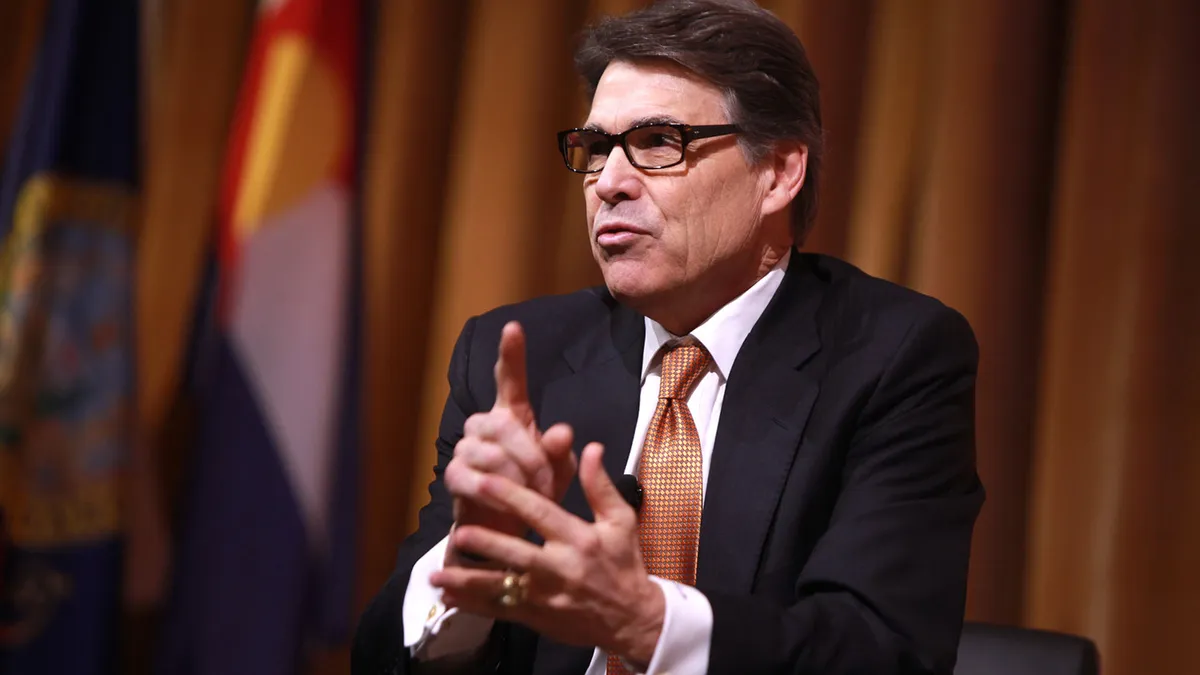Dive Brief:
- Former Texas Gov. Rick Perry (R), President-elect Donald Trump's pick to lead the Department of Energy, told Senate lawmakers he regrets an earlier proposal to eliminate the agency and said he would protect its mission if confirmed.
- Contrary to media reports that the Trump administration is planning to gut DOE funding, Perry said he would defend DOE programs for renewables, fossil fuels, and advanced nuclear energy, as well as basic and applied research and development.
- Perry, like other Trump nominees, said he believes the climate is changing but broke with mainstream science on the causes and pace of change. Perry declined to say whether he believes climate change demands the transformation of the energy sector.
Dive Insight:
The confirmation hearing for Rick Perry was always going to be somewhat contentious. The former Texas governor once proposed eliminating the DOE entirely as a presidential candidate — and then forgot the pledge in a 2011 debate, scuttling his campaign.
But another cloud hung over the Energy and Natural Resources Committee hearing on Thursday morning. According to a report in The Hill, the Trump transition team is preparing a budget proposal that would gut the Department of Energy, rolling back nuclear and advanced computing research to 2008 levels and eliminating DOE departments focused on electricity, efficiency and renewables, and fossil fuels.
Perry distanced himself from the cuts on multiple occasions. Asked first by Sen. Debbie Stabenow (D-MI) if the report is accurate, Perry said he "can’t answer whether that's true or not."
"Sometimes just because it's on the internet doesn't mean it's true," Perry said, stressing his support for advanced computing as "incredibly important for the nation's security."
Pressed by Sen. Maize Hirono (D-HI) on the cuts, Perry said the budget authors may "have the same experience I had and forget they said that."
Perry said that he would protect DOE research programs on renewables, fossil fuels and nuclear, even if they were housed under different department names.
"I will be an advocate. I will be in the room advocating for these types of things," Perry said. "I'm not going to tell you I'll be there 1000% successful in that, but I can assure you and the people who know me ... know my commitment to making sound science, economic science, connected together."
That support for research extended to climate science as well. Late last year, the Trump transition team circulated a questionnaire to DOE employees asking who worked on climate programs. The document startled many in the agency who feared it would be used to axe the initiatives.
"That questionnaire ... went out before I was the nominee," Perry said in response to Cantwell. "I didn't approve it, I don't approve of it. I don't need that information, I don't want that information."
Perry pledged to protect "all the science," whether climate-related or not — a stance that reflects a change in his view of the issue.
Throughout most of his public life Perry either denied or openly mocked the idea of human-caused climate change, saying in 2011 that "a substantial number" of climate scientists "have manipulated data so that they will have dollars rolling into their projects."
But on Thursday, Perry reversed course, repeating a now-familar line that while he believes the climate is changing, it is difficult to ascertain how much is natural, and how much from human causes.
Perry's comments mirrored those given by Rep. Ryan Zinke (R-OK) and Oklahoma Attorney General Scott Pruitt (R-OK), Trump's appointees for the Department of Interior and the Environmental Protection Agency, respectively. In each case, the nominees broke with mainstream climate science, which holds that humans are the dominant cause of warming since the mid-20th century.
Sen. Bernie Sanders (I-VT) pressed Perry on the issue, asking whether Perry thought climate change demands the "transformation of our energy sector away from fossil fuels."
Perry dodged, saying that while an "academic discussion" on climate "is an interesting exercise," he has a proven track record of reducing pollution in Texas through his all-of-the-above energy approach.
Whether Perry will have enough influence in the Trump White House to alter budget plans remains to be seen, but his confirmation at least seems assured. Republicans all appeared satisfied with Perry's hearing, and his comments on protecting DOE programs could see him score some votes from Democrats who fancy him a counterweight against a cut-happy Trump White House.
"We're counting on you to educate the incoming president," Hirono said.














